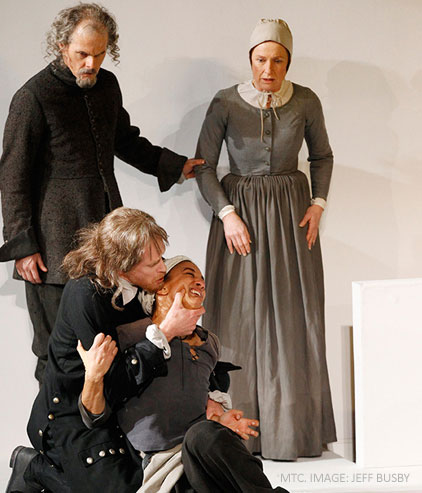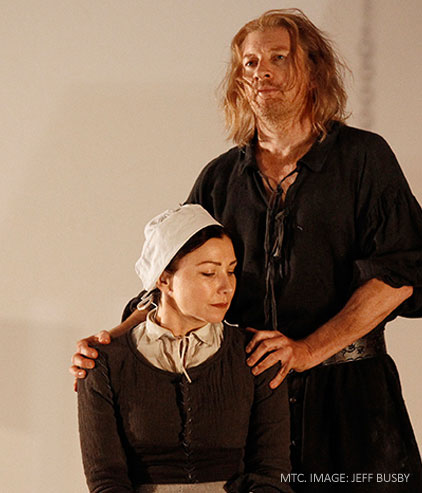It's pretty weird, but Russia has strained relationship with this play.
Does this three-hundred-years-old story from life of the provinces of the Wild West, with all its Puritan mutches and judges' robes seem so far away from Russian theatrical tastes?
And may be this bad cheap popular translation of the title negates its powerful message from the beginning. "The Severe Test" - there is something operetta and melodramatic about it.
But the strict and clear "crucible", similar to the tocsin bell, sounds much more specific. In the belly of this crucible human souls are tested for strength - some of them turn into a shapeless mass, the others are deformed, and only very few ones manage to remain forever themselves, however, paying too high a price. The name of this crucible is controlled mass consciousness.
The collective idea is the cornerstone and lifebuoy for any society. But how often and by insensible degrees it turns into a death trap, like the spring ice. Don't we already know this?
Still, the most incomprehensible thing that struck me after I learned of the existence of this play is absolutely indifferent attitude of Russian directors to it.
Theaters and publishers ignore it, and only the most advanced viewers may remember the good, but still marked with all the amenities of a Hollywood movie, adaptation of 1996.
The West is a different matter. The play is a completely axiomatic thing here and decorates the repertoire of any self-respecting theater - from amateur to professional.
Western viewers know everything about their Crucible. It's very difficult to surprise them with the scenic delights of the new reading.
I thought about it, reading strange arrogant reviews of some Australian critics who ruthlessly crushed the Melbourne Theatre Company's production by Sam Strong. Most of these reviews amused me with dubious assumption that "unsophisticated spectator can fall in love with the show."
Unsophisticated spectator, apparently, was me. A strange Russian tourist, who pulled through half the world in order to spend the cherished night at the Melbourne Theatre The Sumner (O’K, three cherished nights). Of course, I did it not for the sake of Arthur Miller and not for the sake of resonating stage of MTC. But they both were not weak additions to the underlying reason.
So, I had my fond fans' love for the hero of the occasion and my "crucible's inexperience" - a complete lack of anything to compare to this show - against me.
But also I had a decent knowledge of the play in its original language, and half of my life, held on stage of my local amateur theater. And yes! Three tickets for three performances were also on my side!))
A normal alignment.
And show delighted me from the first minute. When the heavy curtain flew up to the sky, a laconic snow-white construction, similar to the whimsically curved sheet of paper, arose from the utter darkness of stage. This amazing meaningful solution immediately elevated the set over time and space. There was only a clear and understandable idea of the author. But his realistic characters were appearing on this sheet like the lines.
Entourage of epoch with its flavor became secondary, and only the characters in their perfectly recreated costumes of 17th-century looked somehow more strongly and clearly, as if they were taken out of context of their time. This amazing combination of avant-garde art and realism made an instant impression on me and set the tone of perception.
Parade of perfectly clear and powerful acting performances won me over once and for all.
The story of Salem Witches was becoming the grim parable.
The parable about fear and fearlessness to be oneself.
Fear was visible in each figure from awesome collection of types that did their dark work on stage. These fears could be of different nature, but they have always remained the main motive and sounding in unison, turned into a terrible weapon of self-defense of the weak and corrupt souls.
It's amazing how these people who were motivated by the many faces of fear and very different reasons understood each other without any words! How passionately they clung to each other in mutual desire to hide their inferiority, their ulcers, to protect themselves and to rise above the community, using its own absurd fears and rituals:
- young predator Abigail - beautiful, Elizabeth Nabben;
- evil moneymaker Putnam - masterful Paul English and his wife fixated on her grief - energetic Heather Bolton;
- ruthless bureaucrat Danforth, cherishing his severe reputation - very strong Brian Lipson
and
- hysterical Reverend Parris - magnificent, just magnificent Greg Stone!

And the ambiguous, the broken, and especially tragic figures were placed in the middle of the spectrum. Their fear was not based on self-interest. It was sincere delusion or desperation:
- almost comical in his simplicity Ezekiel Cheever - funny James Wardlaw;
- distraught Tituba - bright Naomi Rukavina;
- helpless and exhausted Mary Warren - incredible Sarah Ogden;
- and, of course, tremulous and sincere Reverend Hale - excellent Grant Cartwright, so many reasons to fall in love with him)).
In this great battle no one was a walkon, but giants rose on the flank of heroes. No, they were not a line of superheroes. They were ordinary people who were scared also. It was terrible for them to live in a world which gone mad, terrible to lose a loved one, self-esteem, their souls, their names.
The main thing that distinguishes these people - they never let fear dictate the terms. And even in the most tragic moments their moral superiority left a strange feeling of bitter optimism:
- dear old Giles Corey - touching John McTernan;
- wise Rebecca Nurse - queenly Julia Blake;
- replete with tenderness and love Elizabeth Proctor - flawless Anita Hegh);
- and, of course, the reason of the reasons - stormy John Proctor, played by fantastic David Wenham.
Wenham's Proctor is a real defiance, because he really stands out from the Hollywood template of role. He is a realistic and earthly man, who lives by the labor of his hands and by simple rules of honor. He has an amazing ponderous gait, peasant gestures, rustic face expression (up to a point). And his hands. His huge peasant, black hands which he carries as his main treasure. It's impossible to look away from them.

David - Proctor reluctantly joins the plot. He resists with every cell of his body. It's noticeable, it's understandable. He has a lot of other concerns than the silly squabbles and superstitious seizures. Plus, the feeling of guilt, which is a heavy load on his shoulders. He does not pretend to be Atlas, hunching under this burden, he tries to be natural and only occasionally flashes of self-flagellation are pulled out and this seems even more painful. He is himself his own judge and executioner.
Yes, may be his scenes with women are too restrained. But it is nothing but the drawing of the role. Passions are running high in Proctor's soul, but he does not go into pathetic.
And David is very good for team work in such a complex and multipolar play. He never overplays and harmoniously coexists with stage partners, despite all the ardor of his charisma.
In the third act Proctor straightens his shoulders, clashing with the court. David plays it with phenomenal finesse!
His Proctor is not menacing avenger - a sort of Zorro, who came to save everybody. He's resolute and straight, but excited, even naive and touching in his belief that the judges are reasonable people.
But only through the shock and fascinating counterpoints of the story his character goes along a great way of turning into the superb hero, which apparently impatient critics expected from the beginning! A strange impatience))
The laconic mise-en-scenes, complex overtones and fantastic pauses. It's really priceless.
The fourth act is the peak of intension and triumph. Severed Goliath, broken in body and soul, torn between a desire of death and a shame of life. At this point his huge hands are shackled by chains and hidden under tatters of his shirt, and it gives a sore impression of blind desperation.
David's acting is like heart throb in the middle of chaos repressed emotions.
But the incredible burden falls from the shoulders after a sudden and fatal choice. It so happens that "to die" means "to live". And people go to their death happy from the feeling of their freedom, leaving their direct and indirect murderers to live in the dead end of their fear.
Yes, I admit that I am only unsophisticated spectator, a amateur-theatre-goer and devoted fan of David Wenham. Anyway none of my word in this review does not cease to be a sincere truth.
I do not know what the smart critics wanted to see. I wanted to see what the actors and director wanted me to see.))) I think it's a big difference.
And more. I know for sure that grateful public is more luckier)) Just because the quality of acting is in direct proportion to sensitive reaction of the viewers. It's verified thousand times)
Thank you, MTC, for The Crucible, for Sam Strong and for David.)))